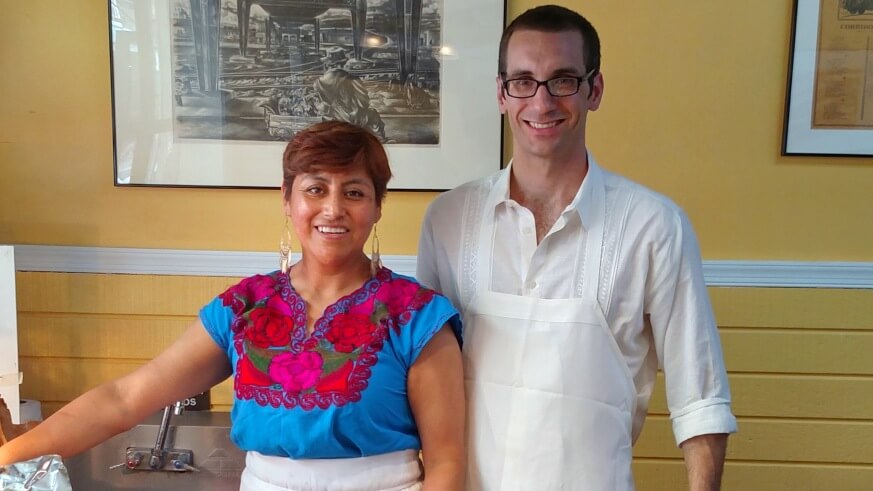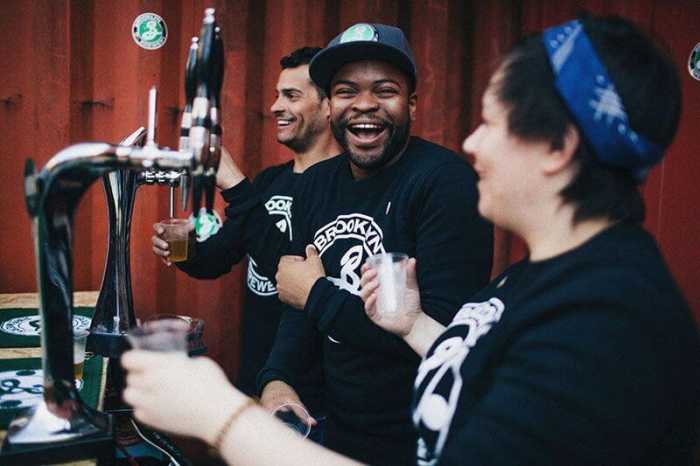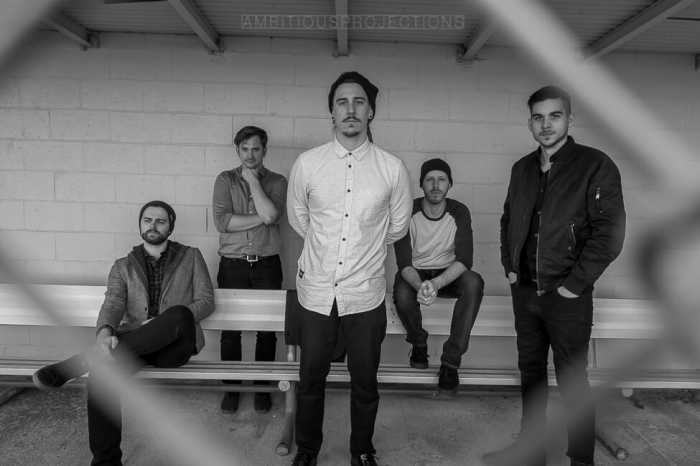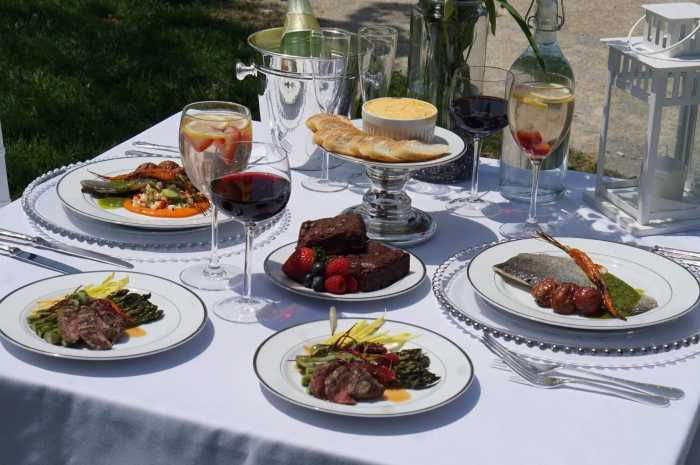The first time immigration rights activists and wedded restaurateurs Cristina Martinez and Benjamin Miller opened shop to sell barbacoa – a Mexican traditional process of butchering and slow-cooking lamb – under the name South Philly Barbacoa, they did so at a small shop on 11th & Morris off East Passyunk Avenue’s culinary mile in 2015.
That was out of necessity – tiny space, new business people. When they moved to the lower half (below Washington) of the Italian Market in 2017, they did so due to tragedy: Martinez’s son Isaias, a fellow restauranteur, passed away, and she and Benjamin wished to honor Isaias’ memory by moving to his 1149 S 9th Street address. Once there, Martinez and Miler used the son’s restaurant name (El Compadre), as well as their own South Philly Barbacoa. Now, one year later, it is the success of Martinez/Miller’s El Compadre with its barbacoa, its proximity to Ninth Street’s deep Mexican population, its political activist-driven art gallery shows and its special event dinners with a diverse wealth of chefs that has the pair moving again – to a larger space cattycorner to 1149.
As of Monday, South Philly Barbacoa resides at the corner of 1140 S. 9th Street. To guarantee its continued activist lean from the get-go, the new spot will hold an opening, which doubled as a political rally for Democrat Mike Doyle, and against Republican Martina White (and her conservative anti-sanctuary city stance), for Pennsylvania House District 170 Representative in the upcoming, November 2018 elections. “ This event comes on the heels of Mayor Jim Kenney’s trailblazing decision not to renew Philadelphia’s contract with ICE to share information contained in the city’s PARS criminal justice database.”
What you need to know about South Philly Barbacoa
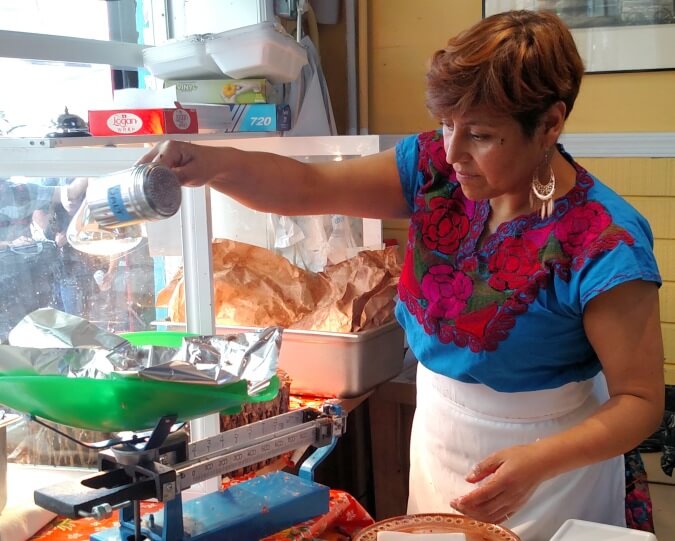
While the South Philly Barbacoa hours of operation are Saturdays, Sundays and Mondays 5 a.m. (!) until they sell out, El Compadre is staying open, Monday through Friday, 7 p.m.-3 p.m., with tortas and guisados
“It is always nice to be in the thick of the Mexican community here,” says Martinez while strolling through the Italian Market for supplies, asMiler applies tile and broken mirror glass to the mosaic outside their new El Compadre corner. “The 11th & Morris space was intimate, but I think a lot of our audience may have felt uncomfortable coming down there, what with ICE officials. The second space of my son’s? It was lovely but, we outgrew it. But we stay in this neighborhood because we love it. This Market is more comfortable for our people. This is their home, our home, and has been for some time.”
Both Martinez and Miller usually lace conversation about food with that of activist immigration-based politics. “We aren’t the front line of activism, but we do have a platform because of the food,” says Miler who formed the Philly-based Popular Alliance for Undocumented Workers’ Rights organization and its’ #Right2Work initiative. These were formed by Miller in consideration of the plight of his wife, Martinez – an undocumented worker from Mexico – who walked the lengths and breadths of a Mexican desert in 2009 to get to America and make money for her kids who remained in her homeland.
As she did in Mexico, Martinez still butchers, then slow-cooks beef, lamb and such to succulent, steamy perfection while friends and family make tortillas of com from an indigenous Zapatista community in Chiapas, a corn named after Cristina’s son, Isaias. This dedication to the artisanal and the handmade is how a fantastic and now-famous Mexican restaurant – one acclaimed by “Bon Appetit” magazine – can serve up helpings of social justice and live art activism with what is notably the best barbacoa in the area.
Ask Martinez what it means for Philadelphia to remain a sanctuary city, and she states that it is crucial to Mexican-American life, not only here but throughout the U.S. “It’s important that we not only remain a sanctuary, but expand the notion of sanctuary, and continue building unity through many communities that are threatened,” she said. “We want to see more cities become sanctuary following the lead of Philadelphia.”
As the Italian Market has blossomed into a Mexican and Korean marketplace, such sanctuary policies are invaluable regarding business sustainability. ”The sanctuary policy gives our business and other business more security, and this is important for the mental well-being of the community,” says Martinez. “The Mexican people here are growing individually and culturally, adapting to Philadelphia and being open and growing even more.”
But El Compadre’s activism isn’t solely concentrated on immigration rights. Two weeks ago, Martinez and Miller held a gathering of 13 young, little-known, African-American Philadelphia chefs at their Ninth Street space. The pop-up event, “Cooking for the Culture,” sold out so fast, and was so welcomed in the neighborhood, its crowds spilled out onto the street in celebration. On August 20 at 6 p.m., El Compadre co-hosts the second of its “Cooking for the Culture” dinners at North Broad Street’s South Jazz Kitchen.
“We hope the people continue to come together in unity for all of our rights,” says Miller of all El Compadre events. “Our food and gallery shows are artistic, collaborative and culinary rather than overtly political, and our rallies are deeply dedicated to change. But any act where a diverse group of creative people comes together to create and interact is a political act in itself in these times of divisive rhetoric.”



